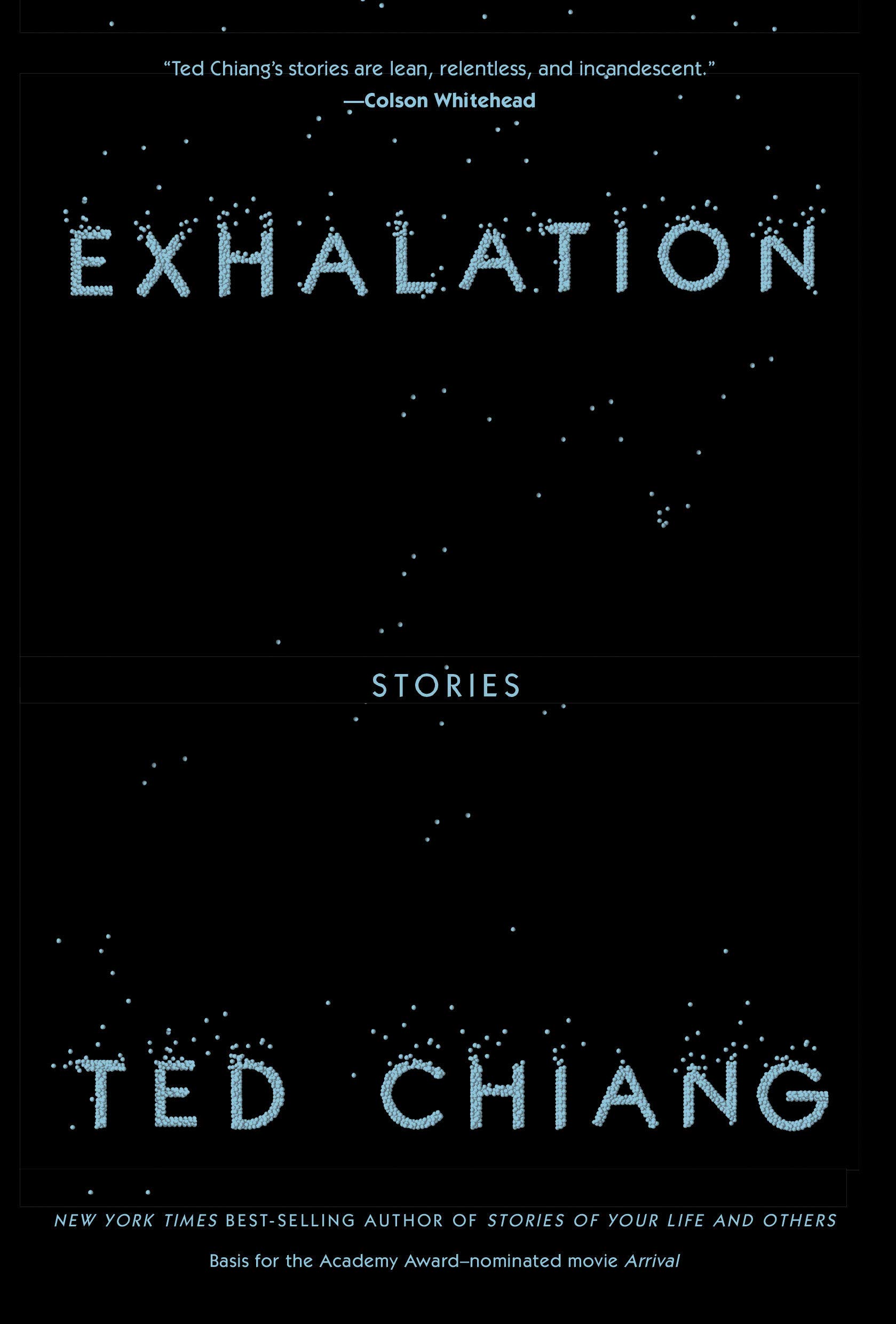A Review of Ted Chiang’s Exhalation: Stories (Knopf, 2019).
By Stephen Hong Sohn

Ted Chiang has graced us with a new collection, Exhalation: Stories (Knopf, 2019), which brings together mostly works that have been previously published in other arenas. As B&N tells it,
“In these nine stunningly original, provocative, and poignant stories, Ted Chiang tackles some of humanity’s oldest questions along with new quandaries only he could imagine. In ‘The Merchant and the Alchemist’s Gate,’ a portal through time forces a fabric seller in ancient Baghdad to grapple with past mistakes and second chances. In ‘Exhalation,’ an alien scientist makes a shocking discovery with ramifications that are literally universal. In ‘Anxiety Is the Dizziness of Freedom,’ the ability to glimpse into alternate universes necessitates a radically new examination of the concepts of choice and free will. Including stories being published for the first time as well as some of his rare and classic uncollected work, Exhalation is Ted Chiang at his best: profound, sympathetic—revelatory.”
I’ll provide you with some shameless self-promotion here, as I wrote about “The Merchant and the Alchemist’s Gate” in Racial Asymmetries, when it was published as a novelette through Subterranean Press. That print run was so limited I needed to get the university I was working at to buy it for something like $150 dollars. In any case, the dream is to still own my own copy of this limited print run, but alas, that’s not going to happen soon. That novelette is something I often teach in a narrative and narrative theory class because it includes a very conscientious use of the frame narrative with accompanying intradiegetic narration. It’s a brilliant time-loop type story in which the protagonist attempts to alter the course of his personal history. He is able to use something called the Gate of Years, which allows anyone who travels through it to travel 20 years either into the future or into the past (depending on where the Gate is located). It’s set during the Islamic Golden Age and is still a work I come back to and reread. The other major reprint is the “Lifecyle of Software Objects,” which was published as a novella also via Subterranean Press, also in a limited print run. By that point, I was already on the Chiang fan bus, so I managed to snag a couple of copies. Fortunately, for all readers, now this publication is also more readily available in this edition. It’s one of my favorites for the simple fact that it explores the life of digients, which are virtual pets that have attained a level of autonomy and sentience. The narrative reminds me of the problem that virtual worlds create when human users stop finding them interesting to interact with. A number of the other stories in the collection boast Chiang’s signature melding of secular thought and religious/spiritual philosophy, such as “Omphalos,” which seems to be a story (if I am reading it right) that explores a kind of mirror Earth dynamic in which scientific discovery, technology and religion are intriguingly intertwined. One of my favorite stories was “The Great Silence,” which (again if I’m reading the story correctly, haha) involves sentient parrots as narrating entities. I don’t always get to see examples of animal narrators, so I really appreciated Chiang’s attempt to render nonhuman subjects in narrative discourse. “Dacey’s Patent Automatic Nanny” was another really wonderful story, which explores the development of the “automatic nanny,” a kind of robot that can be used to care for human children. Once the “automatic nanny” fails in her care-work duties, the popularity of this invention drops drastically. My favorite story of the collection is the “The Truth of Fact, the Truth of Feeling,” which is a narrative I was primed to enjoy when Chiang came to UC Riverside last year to talk about something called “lifelogging,” which is a way of keeping a record of all of your memories that you can then review at any point in time. The story itself involves two different narratives: one involving a father and daughter and the rift that emerges between them and the second involving a tribal type society that is learning the intricacies of written language (in contrast to oral storytelling). The larger point that Chiang’s story makes is whether or not technology is beneficial, especially when it can create shortcuts. If something like lifelogging exists, would humans be able to retain any long-term memory if humans didn’t need to? This question animates this story and makes it one that you’ll certainly want to talk to friends about. Another outstanding collection by Chiang. Let’s hope we won’t have to wait as long for the next publication =).
Buy the Book Here:
https://www.barnesandnoble.com/w/exhalation-ted-chiang/1129288493#/
Review Author: Stephen Hong Sohn
Review Editor: Nicholas Clark
Web Posting: Xiomara Forbez
If you have any questions or want us to consider your book for review, please don't hesitate to contact us via email!
Prof. Stephen Hong Sohn at sohnucr@gmail.com
Nicholas Clark, PhD Student in English, at nclar004@ucr.edu